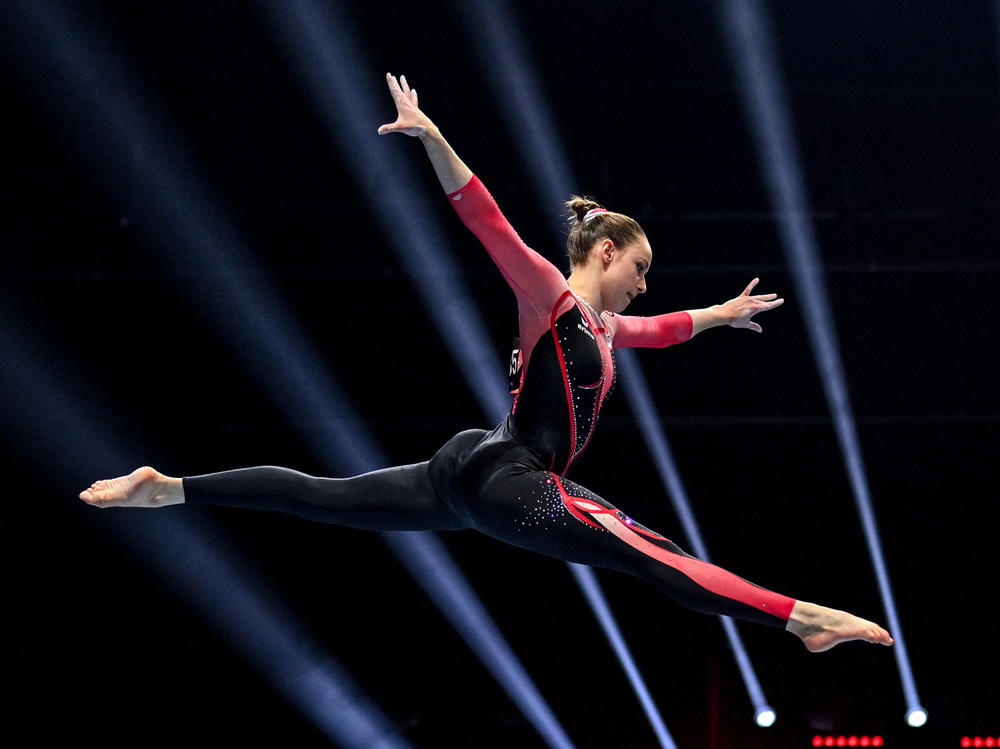Section Branding
Header Content
German Gymnasts Cover Their Legs In Stand Against Sexualization
Primary Content
Three members of the German women's team at the European Artistic Gymnastics Championships in Switzerland recently gained attention for their outfits.
Unlike their peers, their legs were covered.
They wore full-body unitards; most women typically wear leotards that show the entire leg. Male gymnasts, however, usually wear either slightly loose shorts or full-length leg coverings.
Unitards are technically permitted but usually are worn for religious reasons.
It was a statement "against sexualization in gymnastics," the German Gymnastics Federation said.
Elisabeth Seitz, one of the gymnasts, said it was to "set an example ... to all gymnasts who may feel uncomfortable or even sexualized in normal suits. Because, in our opinion, every gymnast should be able to decide in which type of suit she feels most comfortable — and then do gymnastics."
The display was "one of the first examples we have of athletes making a statement that they would prefer to perform their sport in clothing that they are comfortable in rather than clothing that might be geared towards an audience," says Elizabeth Daniels, a psychology professor at the University of Colorado, in an interview with NPR's Weekend Edition. Daniels has written about the sexualization of female athletes.
Here are excerpts of the interview, edited for length and clarity:
Some people have pushed back and say that women's athletic uniforms are tight and revealing because it allows for better performance. Is there any truth to that, in your view?
That explanation doesn't, in my mind, hold much water, because then we would expect to see similar uniforms for men and women. For instance, beach volleyball: Women are playing in bikinis, whereas men are playing in shorts and a tank top. So if there was a performance reason to be wearing very tight, close-fitting clothing, you would expect men to be doing so as well.
Why has this developed this way? Why aren't people wearing similar uniforms?
There's always been this perception that sport is a male-typed domain and that women need to pay attention to demonstrating femininity because they're involved in a male activity, a so-called male activity.
And so we see all the way back to the 1920s, actually, examples of women's sport teams being sexualized in an attempt to sort of nod towards femininity. And so it's not surprising that that has persisted over time. And we're just sort of at the point where there's a bit of a cultural reckoning where that's being questioned by women in sport specifically.
How does having to wear different clothing sort of affect female athletes psychologically?
We actually have some research on this in psychology. We've done studies where we've put women in a bathing suit or a sweater. And when you put women in this bathing suit that makes the body salient, it actually does impact their attentional resources. So the body then becomes kind of front and center on our minds, and we have fewer resources then to allocate to tasks that we might be trying to do.
So when you think about this within sport, the extent to which athletes, female athletes, are worried about whether, you know, their bodies are looking OK in these very tight uniforms, it's a distraction to their performance. And obviously, that's not what female athletes would want to be thinking about, right? They want to be focused on their competition and doing their best.
The question here is also about sexualization. There has been, as we know in gymnastics in particular, but in other sports involving young girls, issues of sexual abuse. Are these things linked?
A real challenge within the sport context is the power differential between athletes and coaches or trainers — anyone who has authority over athletes such that athletes often feel that they just have to do what they're told. And so when you pair that with instances of sexual abuse, athletes may not feel like they can question or speak out about something that's uncomfortable or inappropriate, and then that behavior can persist unquestioned.
So now where we're seeing athletes speaking out about uniforms, you know, it really could be symbolic of the need for athletes to have more voice in general in the sport context, which could alleviate some of these really tragic abuse cases that have come to national and international attention more recently.
Rosemary Misdary and Hadeel Al-Shalchi produced and edited the audio interview. James Doubek produced for the web.
Copyright 2021 NPR. To see more, visit https://www.npr.org.

